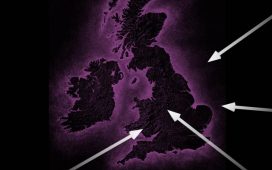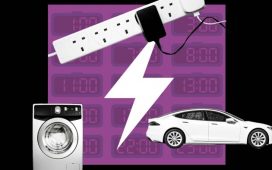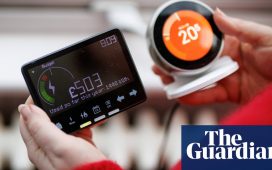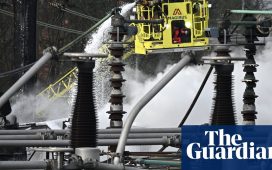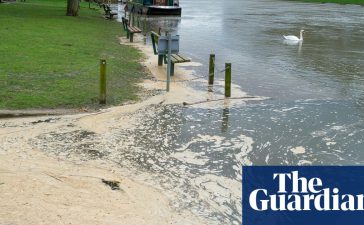Starmer rejects claim he has sold out fishing sector, saying deal is ‘good for fishing’
The leaders are now taking questions.
Q: [From the BBC’s Chris Mason] Haven’t you sold out the fishing sector?
Starmer says the principles behind today are about bills, jobs and borders. The SPS changes will take away a lot of red tape.
Over 70% of seafood goes to EU. This will help them, he says.
The length of time for the agreement provides stability.
Annual negotiations on fishing would have generated uncertainty.
Shellfish can be sold back into the EU, he says.
He end saying this is “good for fishing”.
Key events
-
Closing summary
-
Rachel Reeves says she is ‘listening’ to winter fuel allowance concerns
-
Tory plan to reverse EU deal would be ‘bad for jobs, bills and borders’, says Labour
-
Starmer’s EU deal will repair just small fraction of damage done by Brexit, says Plaid Cymru
-
How deal will allow UK and EU to link emission trading schemes
-
TUC welcomes deal with EU, but says it should be ‘just the beginning’ of boosting links
-
Green party welcomes EU deal as ‘definitely step on right direction’
-
Trade body for Scottish salmon industry hails EU deal as ‘breakthrough’
-
Boris Johnson denounces deal with EU, calling Starmer ‘orange ball-chewing manacled gimp of Brussels’
-
Badenoch claims Starmer’s EU deal has broken all five of her tests for it to be acceptable
-
Education sector welcomes move towards UK rejoining Erasmus+ and setting up ‘youth experience’ scheme
-
Scottish government welcomes key parts of deal with EU, but says fishing industry has been betrayed
-
Von der Leyen ducks question about how much UK might have to contribute to participate in €150bn weapons fund
-
‘Genuine progress’ – business groups welcome deal with EU
-
Energy sector welcomes deal with EU, said it could save billions over course of this parliament
-
Starmer rejects claim he has sold out fishing sector, saying deal is ‘good for fishing’
-
Starmer says British firms will save £800m from emissions trading deal
-
UK and EU agree to hold regular summits every year
-
Starmer, von der Leyen and Costa hold press conference
-
UK-EU summit deal published
-
Meat industry welcomes deal, saying Labour has achieved ‘what previous government promised originally but didn’t deliver’
-
Starmer says he wants to move on ‘from stale old debates’ of Brexit with EU deal
-
Deal with EU will make food cheaper and add £9bn to UK economy, says No 10
-
Youth mobility scheme with EU to be called ‘youth experience scheme’, leak suggests
-
Starmer’s deal ‘far worse than Boris Johnson’s’ for fishing sector, says Scottish Fishermen’s Federation
-
Ed Davey welcomes deal and urges Starmer to ignore ‘naysayers and dinosaurs’ in Reform UK and Tory party
-
Tory claims about EU deal being ‘surrender’ are ‘nonsense’, says Conservative peer and supermarket boss Stuart Rose
-
Deal could lead to ‘end of fishing industry’, Farage claims
-
Minister says deal with EU shows Britain ‘back on world stage’
-
‘Total capitulation’ – Tories attack deal on fishing, even though it extends concessions originally made by Boris Johnson
-
Scottish government complains about not being consulted over deal with EU on fishing
-
Reynolds refuses to deny report saying EU fishing rights in UK waters extended for 12 years under deal
-
EU fishing rights in UK waters extended for 12 years under deal, BBC reports
-
Reynolds suggests EU and UK have agreed youth mobility scheme with cap on numbers
-
Agenda for the day
-
UK-EU reset deal still not agreed, business secretary says
-
What could be in the new security and defence pact that is likely to be announced today?
-
Breakthrough in EU-UK talks
Closing summary
Thank you following along today. This blog is now closing. Below is a roundup of some of today’s story.
-
Downing Street have secured a deal between the UK and EU to remove checks on food exports which it said will add £9bn to the UK economy and lower food prices. The last-minute agreement was secured early on Monday morning.
-
Keir Starmer has rejected claims that he has sold out fishing sector after securing a deal with the EU. He called the deal is ‘good for fishing’ and sakd the principles behind today are about bills, jobs and borders.
-
The TUC welcomed deal but said it should be ‘just the beginning’ of boosting links. Paul Nowak, general secretary of union, said: “Today’s summit represents an important first step towards securing a much-needed closer relationship with the EU. Ministers have made the right call by protecting jobs in key industries, such as steel, from being hit by carbon border taxes.”
To see the full breadth of our coverage today, scroll through the key events tab.
Rachel Reeves says she is ‘listening’ to winter fuel allowance concerns
Chancellor Rachel Reeves has told LBC that she is “listening” to concerns over the winter fuel payment.
The change to the benefit, which was removed from about 10 million pensioners after it became means-tested, was seen as a major contributor to Labour’s drubbing at the local elections earlier this month.
When asked whether she was considering raising the threshold at which pensioners become eligible for the payment, Reeves said: “We’re always listening to these things”
Keir Starmer has issued a joint statement with leaders of France and Canada condemning Benjamin Netanyahu’s “egregious” actions in Gaza, warning that the UK and allies will take “concrete actions” unless he changes course.
The statement, made alongside Emmanuel Macron and Mark Carney called Israel’s expansion of military operations in Gaza as “wholly disproportionate”, adding that the “level of human suffering in Gaza is intolerable”.
We will not stand by while the Netanyahu Government pursues these egregious actions. If Israel does not cease the renewed military offensive and lift its restrictions on humanitarian aid, we will take further concrete actions in response.”
It describes the Israeli government’s “denial of essential humanitarian assistance” as “unacceptable” and says it risks breaching international humanitarian law. In addition, it condemns the “abhorrent” language used by Israeli politicians threatening civilians to relocate from Gaza.
Keir Starmer has arrived in parliament to meet backbench Labour MPs.
They could be heard clapping as the prime minister entered the meeting with home secretary Yvette Cooper.
Asked by reporters whether he was pumped for the meeting, Starmer replied: “Always.”
The prime minister is currently under pressure over proposals to cut disability benefits.
Tory plan to reverse EU deal would be ‘bad for jobs, bills and borders’, says Labour

Andrew Sparrow
At her press conference earlier Kemi Badenoch said the Conservatives would “reverse” the government’s EU deal (although she was not specific about how, and she admitted that there were parts of it that met with her approval).
On the basis of that, the Labour party issued a statement saying:
Kemi Badenoch’s posturing would leave our country poorer, less safe, and cowering on the world stage.
The Tory leader failed to land deals with the US, India and EU when she had the chance as trade secretary.
Ripping up our EU deal would be bad for jobs, bills and borders.
That is all from me for today. Sammy Gecsoyler is taking over now.
There will be a Commons vote on at least one aspect of the deal, my colleague Jessica Elgot points out on Bluesky.
One remarkable thing which shows how far we have come. There will be a vote in parliament on the agrifoods deal with the EU.
Once, that would have been the top line of every news story. Starmer is first PM in more than a decade who doesn’t have to worry about that vote at all.
Jess also points out that today’s was a rare example of the government talking openly about the economic damage done by Brexit.
The second most remarkable thing is that the government issuing its own press releases about just how much damage Brexit has done to trade and our economy. How many years of pretending that wasn’t happening?

Julia Kollewe
Julia Kollewe is a Guardian financial reporter.
Stephen Phipson, who runs Make UK, the manufacturers’ organisation, has welcomed the government’s “pragmatic approach to improving relations with the EU, still our largest trading partner”.
Commenting on the deal, he said:
Removing trade frictions on GB food imports and exports is a priority and will help bring an end to the spectre of food exports bound for the EU lying rotting in British ports while awaiting customs clearance. And confirmation that the UK and EU will look to strengthen and cooperate on food standards (SPS) arrangements will bring much needed clarity to the sector.
The agreement that the UK and EU will link their carbon markets to avoid taxes on carbon-intensive goods like steel and cement travelling between the UK and EU is also welcome news as is the proposed youth mobility scheme, which will allow young talent to flow between the UK and the EU once again.
According to Jessica Parker, the BBC’s Berlin correspondent, on social media, in Brussels there is some mild ‘we told you so’ gloating going on in private.
There is a *bit* of gloating going on in Brussels about #UK / #EU deal.
One diplomat writes: “The deal is balanced—arguably with favourable terms for the EU—and simply shows that splendid isolation is not an option in today’s climate.”
David Henig, UK director of the European Centre For International Political Economy, a trade thinktank, has a useful thread on the deal starting here. And here are some of his conclusions.
My initial impressions – probably more balanced than I was expecting with UK clearly prioritising Home Office issues. But less detail – talks on individual issues are going to be really difficult. There will need to be a strong political layer to maintain progress.
This is a reasonable start to the normalisation of UK-EU relations away from the fantasies we see from the Conservatives and Reform. But that’s all it is, a start, and both sides have much more to do to turn this into a productive partnership.
So there’s a big gap between the obviously modest trade deals the government is doing, which don’t particularly prioritise growth, and the half-baked narrative that claims these are going to deliver great results. But at least actions are mostly sane.
Formally now time to welcome the UK to a Swiss-style relationship of permanent negotiation and multiple deals with the EU.
Simon Usherwood, an academic and Brexit specialist, has posted this chart on Bluesky summing up what is in the deal agreed today. It highlights the point that, while some aspects have been firmly agreed, others are still being negotiated, or are just matters for discussion.
Usherwood has also got a thread on Bluesky summing up his assessment. Here are some of his conclusions.
However, all this has landed probably at the better end of where UK govt might have hoped:
– noises off as expected, but weakened by the rejections made w/o even waiting for the texts
– mild surprise at extent of the list of topics under discussion
In sum, a reasonable place to start, but very much a marathon, not a sprint
Starmer’s EU deal will repair just small fraction of damage done by Brexit, says Plaid Cymru
Like the Green party (see 4.43pm), Plaid Cymru has described today’s deal as a step on the right direction. But it says the government should go much further and rejoin the single market and the customs union.
This is from Liz Saville Roberts, Plaid’s leader at Westminster.
It is welcome that we are finally beginning to move beyond the illusions and false promises that characterised the Brexit years. Today’s EU ‘reset’ marks a step in the right direction, but the UK government must go much further. Keir Starmer has an opportunity to show bold leadership by facing economic reality: rejoining the single market and customs union is clearly in our economic interests.
For Wales, stronger ties with our European neighbours mean a stronger economy, thriving communities, and restored opportunities for our young people. The numbers speak for themselves – today’s deal adds just 0.2% to UK GDP by 2040, a fraction of the 4% loss to GDP inflicted by Brexit, as estimated by the Office for Budget Responsibility.

